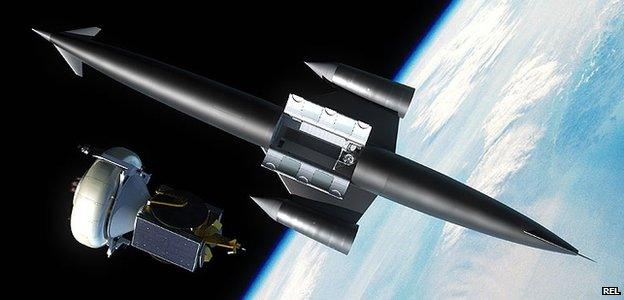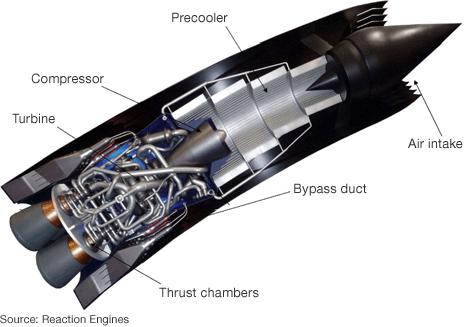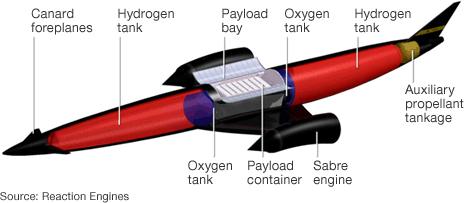Esa study examines Skylon space plane
- Published

Skylon would use a recoverable secondary propulsion module to place a satellite in its final orbit
A consortium of companies will try to establish the business case for a reusable space plane in a new European Space Agency (Esa) funded study.
The concept under investigation is Skylon, a vehicle proposed by the UK firm Reaction Engines Ltd (REL).
Skylon would be powered by an air-breathing rocket engine that could enable it to take off and land at a standard runway.
Esa funding for the study is 1m euros (£0.9m).
It will run to the end of the year and will look at how a Skylon vehicle might operate in a market for satellite launches from the early 2020s onwards.
The research will be led by REL themselves. It will address the economics and some of the outstanding technical issues.
The latter includes examining the type of spaceport needed by the vehicle; and the team will visit French Guiana to see how a Skylon could fly out of Europe's existing launch facility in the territory.
There will be work done also to define more clearly the upper-stage carrier required for the Skylon concept.
As envisaged, the plane would fly to just above 300km and then release a secondary propulsion module to place a satellite in its final orbit. For telecommunications spacecraft, the main focus of the study, this would be at an altitude of 36,000km. It is an approach that was adopted by the US space shuttle in its early years.
Thales Alenia Space (TAS) of Italy will look at the specifications of this carrier, with assistance from Astrium Germany. The desire is to make it recoverable, so that after deploying the satellite, the propulsion module would return to Skylon to be brought back down to Earth for use on a later mission.
The contract for the Skylon-based European Launch Service Operator (Selso) study has been issued by Esa's launcher directorate, and draws funds from the agency's general studies and support budgets.
As well as overseeing work on Esa's existing rockets, such as Ariane, the launcher directorate is also constantly scanning the horizon for future launch technologies.
The agency's technical officer for the new study, Julio Aprea, told BBC News: "We are in full development of Ariane 5ME and have already started the development of Ariane 6 in Phase A, but we have to keep our eyes open. If the Skylon vehicle exists some day, it will be a game-changer for everyone."

Sabre is part jet, part rocket engine
A truly reusable space plane has the potential to significantly lower the cost of getting into orbit.
Although it would take billions of pounds to develop, such a vehicle offers the prospect of a reduced unit price per mission because of the frequency of use - in the same way as an expensive modern airliner can turn a profit.
Skylon would be an automated plane measuring a little over 80m in length and some 325 tonnes in mass. It would carry about 15 tonnes to low-Earth orbit.
Its key enabling technology would be REL's Synergistic Air-Breathing Rocket Engine (Sabre), which employs a very novel heat-exchanger to cool hot gases entering the engine intake.
The power unit would work like a jet at slow speeds in the lower atmosphere but then transition to full rocket mode at high speed in the upper atmosphere to make the jump to orbit.
Sabre is currently in development. It has been earmarked as a "high priority" technology project by the UK government following favourable technical reports from Esa's propulsion experts.
"At the end of the study we would like to have demonstrated the full business case for an operator, whoever that might be," said Mark Hempsell, REL's future programmes director.
"It would be an operator who has bought two Skylons, some upper-stages, some other equipment and flies out of Kourou in French Guiana. We have a market that is defined in the [study] requirements and our aim is to determine how much money this operator could make," he told BBC News.
As well as TAS, the consortium includes QinetiQ Space in Belgium and 42 Technology Limited in the UK. They too will look at various technical aspects. The London Economics consultancy will assess some of the main business issues.

Jonathan.Amos-INTERNET@bbc.co.uk and follow me on Twitter: @BBCAmos, external
- Published16 July 2013
- Published26 June 2013
- Published28 November 2012
- Published11 July 2012
- Published27 April 2012
- Published24 May 2011